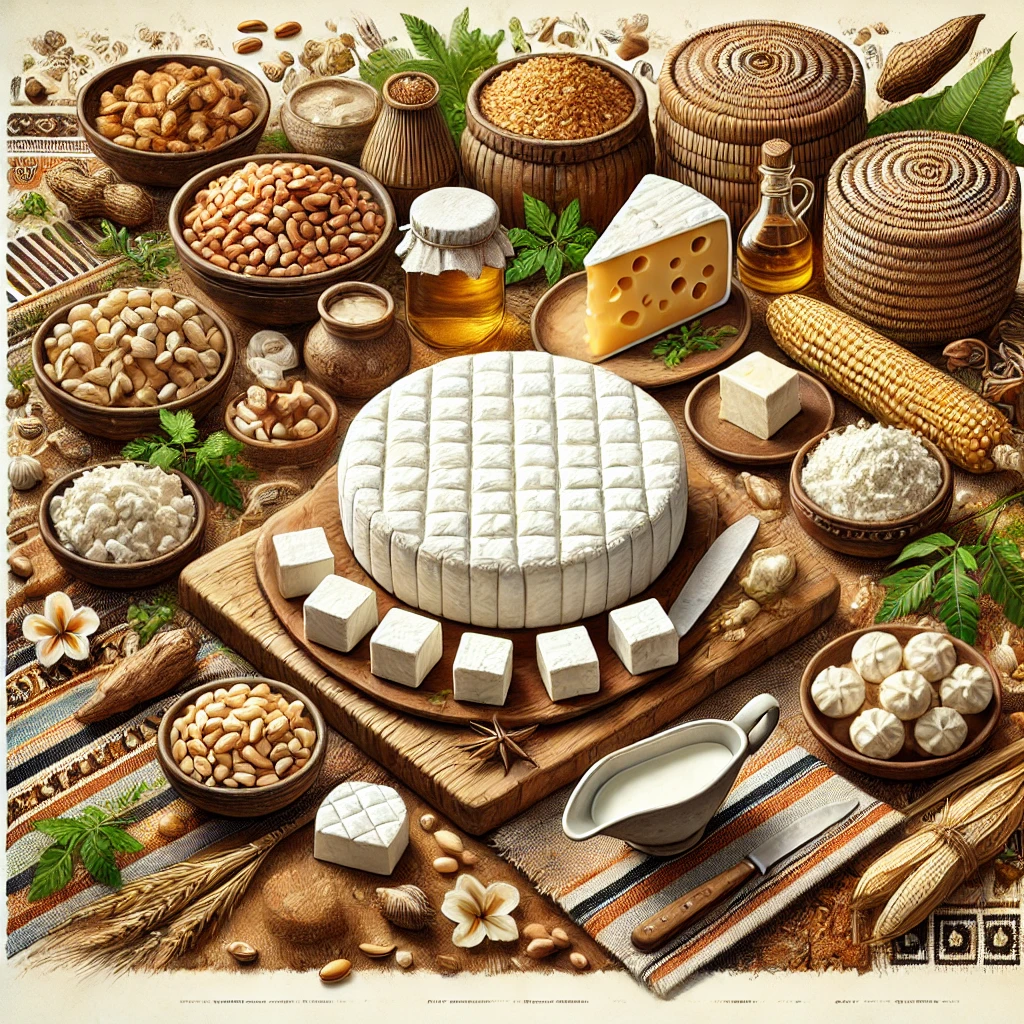Across Africa, cheese traditions are often deeply local, shaped by climate, livestock, and nomadic lifestyles rather than by aging cellars or formal classifications. One such cheese is Ndambu, a traditional dairy product from Cameroon that reflects pastoral knowledge passed down through generations. Simple in appearance yet culturally rich, Ndambu cheese offers a rare glimpse into everyday food traditions rooted in mobility, resilience, and respect for milk as a vital resource.
In this comprehensive, SEO-friendly guide, we explore Ndambu cheese from Cameroon, including its origins, production methods, taste profile, cultural importance, uses, pairings, and modern relevance—written in a clear, human tone and optimized for strong first-page ranking.
What Is Ndambu Cheese?
Ndambu is a traditional fresh cheese made primarily from cow’s milk, closely associated with Fulani (Mbororo) pastoral communities. It is a soft, lightly pressed cheese that is usually consumed fresh, sometimes the same day it is made.
Key characteristics include:
-
Soft to semi-soft texture
-
Mild, fresh dairy flavor
-
Light acidity
-
Minimal salting
-
No aging or rind
Ndambu is not an industrial cheese. It is made for immediate nourishment, portability, and sharing within households and communities.
Origins of Ndambu Cheese in Cameroon
Ndambu originates in northern and central regions of Cameroon, where cattle herding has long been a way of life. Fulani pastoralists move seasonally with their herds, following grazing and water availability. This mobile lifestyle shaped the type of foods they could produce—foods that required:
-
Minimal equipment
-
Short preparation time
-
No long aging or storage
Ndambu emerged as a practical response to fresh milk abundance, allowing families to transform milk into a more filling, transportable food while retaining its nutritional value.
Why Ndambu Cheese Exists: Practicality and Pastoral Wisdom
In hot climates where refrigeration was historically unavailable, fresh milk spoiled quickly. Ndambu cheesemaking provided a way to:
-
Reduce milk waste
-
Concentrate nutrients
-
Create food that could last slightly longer than raw milk
Unlike dried cheeses or fermented milk drinks, Ndambu occupies a middle ground—fresh, but more stable than milk.
How Ndambu Cheese Is Traditionally Made
Ndambu production relies on simple, time-tested techniques, often performed outdoors or in temporary shelters.
Step 1: Milk Collection
Fresh cow’s milk is collected, usually early in the morning. Milk quality depends heavily on the animals’ grazing, which includes grasses and wild plants.
Step 2: Heating
The milk is gently heated over a fire—not boiled—to encourage curd formation.
Step 3: Coagulation
Natural coagulants are used. These may include:
-
Plant extracts
-
Sour milk from a previous batch
This step causes the milk proteins to separate into curds and whey.
Step 4: Draining and Shaping
The curds are scooped out and placed into cloth or woven molds to drain excess whey. Light pressing shapes the cheese into small rounds or blocks.
Step 5: Cooling and Consumption
Once drained, Ndambu is ready to eat. It may be consumed immediately or within a short time frame.
Taste Profile: Mild, Clean, and Comforting
Ndambu cheese is valued for its gentle and nourishing flavor, not intensity.
Flavor Notes
-
Fresh milk sweetness
-
Light tang
-
Very mild saltiness (or none)
-
Clean, natural finish
Its subtle flavor makes it suitable for all ages and easy to combine with other foods.
Texture and Appearance
-
Soft and slightly springy
-
Moist but not runny
-
White to off-white color
-
Smooth surface without rind
The texture resembles a soft farmer’s cheese or fresh curd.
Ndambu in Cameroonian Food Culture
Ndambu is closely tied to daily life and hospitality rather than formal meals.
Traditional Uses
-
Eaten plain as a snack
-
Shared with family members
-
Served to guests as a sign of welcome
-
Combined with grains or flatbreads
It is often eaten alongside staple foods such as millet or sorghum-based dishes.
Pairings for Ndambu Cheese
Traditional Pairings
-
Millet porridge
-
Sorghum flatbread
-
Boiled grains
Vegetables and Additions
-
Fresh peppers
-
Leafy greens
-
Onions
Drinks
-
Fresh milk
-
Light fermented milk beverages
-
Water or herbal infusions
These simple pairings highlight Ndambu’s mild character.
Nutritional Value and Benefits
Ndambu cheese is highly valued for nutrition, especially in pastoral communities.
Nutritional Highlights
-
High-quality protein
-
Calcium and phosphorus
-
Easily digestible fats
-
Fresh, minimally processed
Because it is lightly processed, it retains much of milk’s original nutritional profile.
Ndambu vs Other African Fresh Cheeses
| Cheese | Region | Texture | Preservation |
|---|---|---|---|
| Ndambu | Cameroon | Soft | Fresh |
| Wara | West Africa | Soft | Fresh |
| Ayib | Ethiopia | Crumbly | Fresh |
Ndambu is milder and less acidic than many other African fresh cheeses.
Seasonal and Regional Variations
Ndambu varies depending on:
-
Milk availability
-
Grazing conditions
-
Household tradition
During rainy seasons, milk is richer and Ndambu tends to be creamier. In drier periods, it may be firmer and slightly tangier.
Modern Changes and Challenges
Ndambu remains mostly informal and household-based, but it faces challenges:
-
Urbanization
-
Reduced pastoral movement
-
Limited market access
However, interest in traditional African foods and artisanal dairy is slowly growing. Some local initiatives aim to:
-
Document traditional methods
-
Improve hygiene without altering tradition
-
Support women involved in dairy processing
How to Enjoy Ndambu Today
Traditional Approach
-
Eat fresh, the same day
-
Combine with grains or bread
-
Share communally
Modern Adaptations
-
Crumble into salads
-
Pan-warm lightly
-
Pair with vegetables and mild spices
Because it is fresh, Ndambu should always be consumed quickly.
Why Ndambu Cheese Matters
Ndambu cheese represents living food heritage. It is not standardized, exported, or protected by labels—but it carries something equally important: knowledge shaped by environment and survival.
In a global food landscape increasingly interested in:
-
Minimal processing
-
Traditional diets
-
Sustainable food systems
Ndambu stands as a reminder that some of the world’s most meaningful foods are made not for markets, but for communities.
Frequently Asked Questions (FAQ)
What is Ndambu cheese?
Ndambu is a traditional Cameroonian fresh cheese made from cow’s milk, commonly produced by pastoral communities.
What does Ndambu cheese taste like?
It tastes mild, fresh, and lightly tangy, with a clean dairy flavor.
Is Ndambu cheese aged?
No. Ndambu is a fresh cheese meant to be eaten shortly after production.
How is Ndambu cheese traditionally eaten?
It is eaten plain or with grains, flatbread, or vegetables and shared within families or with guests.
Is Ndambu cheese still made today?
Yes, it is still widely made in rural and pastoral regions of Cameroon, mainly for local consumption.



